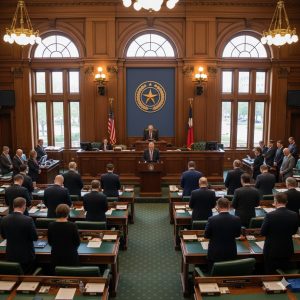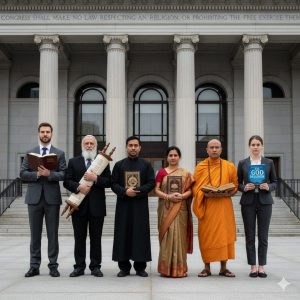
“Proclaim liberty throughout all the land unto all the inhabitants thereof.” — Leviticus 25:10 (KJV)
There are things that belong to kings, and there are things that belong to God. And then, there is the territory of conscience. A place no earthly throne or lawmaker may step foot in without sinning against Heaven. Religious liberty is not a courtesy given to us by kind governments. It is not the product of the Enlightenment, nor the political philosophies of men who sought to escape monarchies. It existed long before parchments and pens tried to capture it. It was written into the fabric of our creation.
When Christ said, “If the Son therefore shall make you free, ye shall be free indeed” (John 8:36), He wasn’t appealing to Rome. He wasn’t calling for a rebellion of arms. He was declaring the freedom of the soul—the freedom no sword could grant and no empire could take away. Religious liberty is not issued by men. It is merely recognized when men are wise, and despised when men are wicked. Opposition to religious liberty is threatened most, not by the irreligious, but by the nominally religious, in an effort to cover their wanton lust for control. We have seen it happen in history, and it will happen again.
The Choice in Eden
Freedom has always carried risk. God did not guard the Tree of Knowledge with angels wielding fire. He placed it within reach. He allowed the test to stand. Love, without choice, is not love. If Adam and Eve could not choose, they could not love, either. And so, in giving freedom, God bore the cost of rebellion. A cost He was willing to pay.
The great controversy itself was born out of this. Satan accused God’s government of being unjust, restrictive. Christ answered, not by force, but by condescension—by entering a broken world and winning allegiance through love.
Liberty, then, was not tacked onto the plan of salvation. It was there from the beginning. It is central to God’s government of love. This is not to mean sin is tolerated; only that aversion to sin and adherence to righteousness can only be valid in a freewill environment free of coercion, and that it is a product of choice, not programming.
Caesar’s Limits
Jesus made it plain enough.
“Render therefore unto Caesar the things which are Caesar’s; and unto God the things that are God’s” (Matthew 22:21).
Taxes, roads, civil order—these belong to Caesar. Worship does not. The soul does not. Conscience does not.
But history shows how easily men blur those lines. How easily kings and parliaments and councils have tried to climb God’s throne, commanding worship where they have no right to command.
And when they do—When the magistrate demands what belongs to the Lord alone—Then the Christian must answer as Peter and the apostles did, standing before earthly power and saying quietly, “We ought to obey God rather than men” (Acts 5:29).
Not out of rebellion. But out of righteousness.
A Flicker in History
For a moment, in a small corner of history, a government arose that dared to recognize the sacredness of conscience. The American experiment, for all its brokenness and inconsistencies, acknowledged it:
“Congress shall make no law respecting an establishment of religion, or prohibiting the free exercise thereof…”
It was not born easily. It was purchased with the blood of those persecuted both by Rome and by Protestant princes.
The Baptists of Rhode Island.
The Quakers of Pennsylvania.
The Seventh-day Baptists.
Their cries found their way into the ink of a fledgling nation. But liberties, like gardens, must be tended—or they decay. It is no surprise that the protections they wrote have been eroding, often slowly, often under the banners of patriotism or public health or common good.
The dragon of coercion sleeps lightly.
Ellen White warned us of it. She saw the day when Protestant America would clasp hands with Rome, forsaking its own founding principles (The Great Controversy, p. 588). And we have seen enough already to know she was no alarmist.
Liberty Is for Everyone
Religious liberty must be defended even for those we disagree with—or it is no liberty at all. If a Muslim is denied his right to pray, I ought to tremble. If a Hindu is forbidden to worship, I ought to protest. If an atheist is forced to mouth prayers he does not believe, I ought to resist. Because the right to worship, or not to worship, is a right God has granted—not men. When we defend liberty only for those who believe as we do, we have already left the spirit of Christ and embraced the spirit of Rome.
Where the Real Battle Lies
The great test before us will not be about mere knowledge. It will be about loyalty. Faithfulness to God when it costs everything to be faithful. When Sunday laws are passed, when conscience is bound by civil power, when the world demands worship that God has not commanded—That will be the dividing line.
And it will not be fought with swords. It will be fought in the hidden places of the soul. It will be fought by those willing to lose homes, jobs, comforts, even life itself, rather than betray the God who bought them.
“Be thou faithful unto death, and I will give thee a crown of life” (Revelation 2:10, KJV).
The battle is not far off. It has already begun—in the small choices, in the small loyalties, in the private decisions of conscience. In the actions of character.
May we be found standing.


